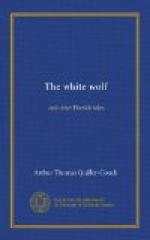“Thank you,” said Ferdinand. “But we are very busy to-day and must take one thing at a time. Can you tell us the way to the sea, please?”
The woman pointed along a path which led to a moss-covered gate and an orchard where the apple-blossom piled itself in pink clouds against the blue sky: as they followed the path they heard her laughing, and looked back to see her still staring after them and laughing merrily, while Valentine and Orson leaned on their swords and laughed too.
The orchard was the prettiest in the whole world. Blackbirds played hide-and-seek beneath the boughs, blue and white violets hid in the tall grass around the boles, and the spaces between were carpeted with daisies to the edge of a streamlet. Over the streamlet sang thrushes and goldfinches and bull-finches innumerable, and their voices shook down the blossom like a fall of pink snow, which threatened to cover even the daisies. The Grand Duke and the Princess believed that all this beauty was in their honour, no less than the chorus of the bells floating across the tree-tops from the city.
“This is the best of all,” said Ferdinand as they seated themselves by the stream. “I had no idea marriage was such fun. And they haven’t even forgotten the trout!” he cried, peering over the brink.
“Can you make daisy-chains?” asked the Princess timidly.
He could not; so she taught him, feeling secretly proud that there was something he could learn of her. When the chain was finished he flung it over his neck and kissed her. “Though I don’t like kissing, as a rule,” he explained.
“And this shall be my wedding present,” said she.
“Why, I brought you six waggon-loads!—beauties—all chosen by my Chancellor.”
“But he didn’t make or choose this one,” said Sophia, “and I like this one best.” They sat silent for a moment. “Dear me,” she sighed, “what a lot we have to learn of each other’s ways!”
“Hullo!” Ferdinand was staring down the glade. “What’s that line at the end there, across the sky?”
Sophia turned. “I think that’s the sea—yes, there is a ship upon it.”
“But why have they hung a blue cloth in front of it?”
“I expect that’s in our honour too.”
They took hands and trotted to the end of the orchard; and there, beyond the hedge, ran a canal, and beyond the canal a wide flat country stretched away to the sea,—a land dotted with windmills and cattle and red-and-white houses with weathercocks,—a land, too, criss-crossed with canals, whereon dozens of boats, and even some large ships, threaded their way like dancers in and out of the groups of cattle, or sailed past a house so closely as almost to poke a bowsprit through the front door. The weather-cocks spun and glittered, the windmills waved their arms, the boats bowed and curtseyed to the children. Never was such a salutation. Even the blue cloth in the distance twinkled, and Ferdinand saw at a glance that it was embroidered with silver.




